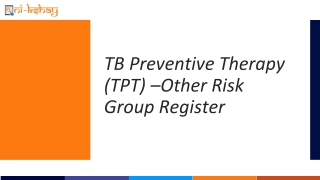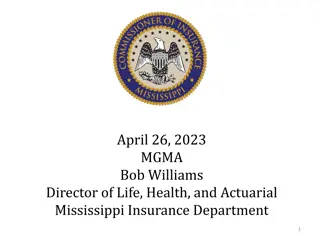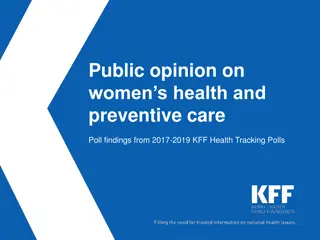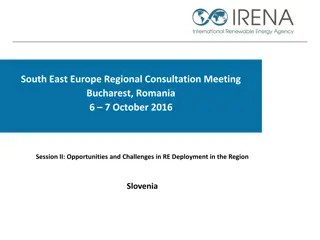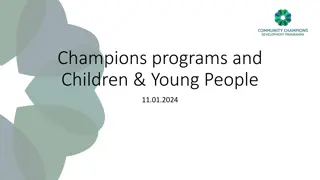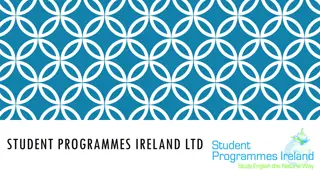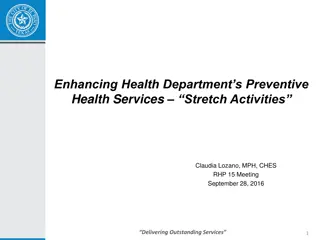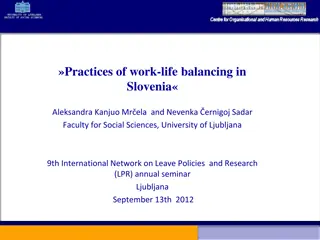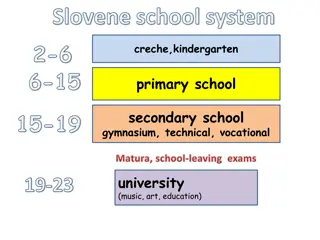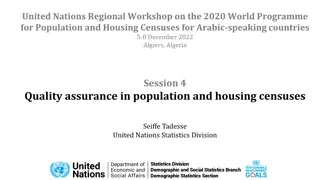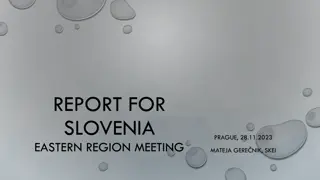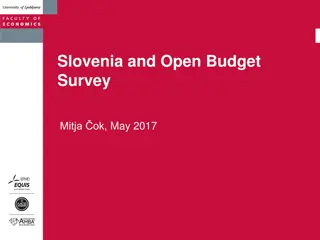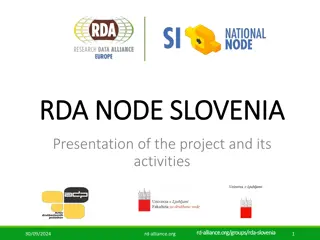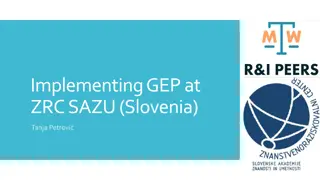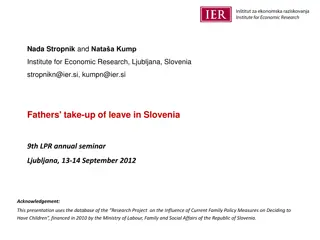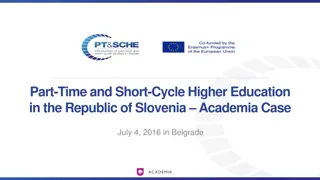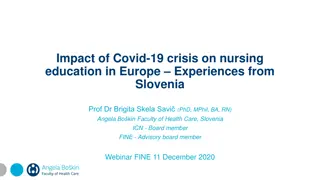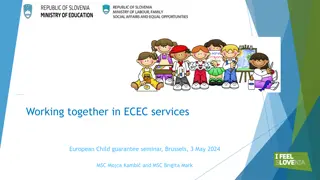Preventive Healthcare Programmes for Children in Slovenia
Current preventive healthcare programmes in primary pediatric care in Slovenia include services such as children and youth preventive healthcare, cancer screening, home visiting, reproductive and oral health care, as well as preventive care for athletes and occupational health. Well-child visits are structured through prenatal phases, infancy, early childhood, middle childhood, and adolescence, ensuring comprehensive and timely healthcare services for children. The system also includes newborn preventive healthcare programmes provided by maternity hospitals.
Download Presentation

Please find below an Image/Link to download the presentation.
The content on the website is provided AS IS for your information and personal use only. It may not be sold, licensed, or shared on other websites without obtaining consent from the author. Download presentation by click this link. If you encounter any issues during the download, it is possible that the publisher has removed the file from their server.
E N D
Presentation Transcript
Prevention in primary paediatric care - SLOVENIA Margareta Seher Zupan i *, Polonca Truden-Dobrin** *Children and school children health services, Health care center Velenje, Slovenia **National institute of public health
Current preventive health care programmes at primary level in Slovenia (financed by obligatory insurance scheme) Defined by the Rules on preventive health care at the primary level (Official Gazette, No. 19/1998 ): Children and youth preventive healthcare at primary level Newborn preventive healthcare programme at the maternity hospitals Adult preventive healthcare at primary healthcare, National programme on primary prevention of cardiovascular diseases since 2002, RA since 2011 Cancer screening programmes: DORA, ZORA, SVIT Home visiting service Reproductive preventive healthcare Oral health preventive health care Preventive healthcare for athletes Occupational preventive healthcare.
Location and number of child and adolescent health services, Slovenia GP and family medicine Child and adolescent health care services 300 65 913 365 978
Well-child visits: prenatal phase and birth, Slovenia 2015 Prenatal phase: 1st visit in 8th to12th week of pregnancy 2nd visit in 16th week of pregnancy, 3rd visit in 20th to 22nd week of pregnancy, 4th visit in 24th to 26th week of pregnancy, 5th visit in 28th to 30th week of pregnancy, 6th visit in 32nd to 34th week of pregnancy, weekly visit after 36th of pregnancy Altogether 10 preventive visits in pregnancy are payed by the obligatory insurance. The provider of care is specialist in obstetrics and gynaecology Newborn preventive healthcare programme at the maternity hospitals: Two well-baby checks including physical exam, screening and anticipatory guidance carried out after birth and during stay at the maternity hospital by paediatritiana and nurses.
Well-child visits: infancy, early childhood, middle childhood, adolescence, Slovenia 2015 Health visitor visits the mother and the baby the day after they come home from the maternity hospital. Altogether 2 visits of the mother and 6 visits of the baby in the first year. Well child visits at paediatrician: Infancy: 1st, 3rd, 6th, 9th month, Early childhood: 12th, 18th month, 3 years Middle childhood: 5 years, 6 years (1st grade of primary school), 8 years (3rd grade of primary school) Adolescence: 11 years (6th grade of primary school), 13 years (8th grade of primary school), 15 years (1st grade of secondary school), 17 years (3rd grade of secondary school).
Wellchild visits for infants, children and adolescents Surveillance of development, physical examination Growth monitoring Screening Immunizations Laboratory tests Health education in health services setting and in kindergartens and schools Parents Children and adolescents Anticipatory guidance
Well-child visits: prenatal phase and birth, Slovenia 2015 US lab TEOAE Hip US screening 1st visit 20 weeks 36 weeks 40 weeks At birth + + + - + + + + Health authorities in Slovenia recommend an evidence based developmental screening test. If a test is abnormal, there is an agreed referral system.
Well-child visits: infancy, early childhood,, Slovenia 2015 H, W Blood pressure Denver test + Visio n Lab US Vacc. 1 m 2 m 3 m 4-5 m 6 m 9 m 12m 18 m 3 y + + + P, N N P, N P, N + + + + + + + + + + + + + + + + P, N P, N P, N P, N P, N, Ps P, N, Log + + + + + + + 5 y + + + + +
Well-child visits: middle childhood, adolescence, Slovenia 2015 H,W Blood pressure Vision Hearing Lab Vac. Preschool visit 1st grade 3rd grade 6th grade 8th grade 1st grade/sec. 3rd grade/sec. + + P, N + + + + + + + + + + + + + + + + + + P, N P, N P, N P, N P, N + + + + + + + P, N
The proportion of children and adolescents that attended the preventive check-up, Slovenia 2011 Dele sistemati no pregledanih otrok in mladine 2011 % v 1 mesecu 95,6 v 12 mesecu 78,9 v starosti 3 let 99,0 70,3 v starosti 5 let pred vstopom v O 95,7 v 1. razredu 93,8 v 3. razredu 96,2 v 6. razredu 88,3 v 8. razredu 93,7 95,4 v O s prilag. prog v 1. letniku S 83,0 v 3. letniku S 86,0 50,0 60,0 70,0 80,0 90,0 100,0
Recommended or compulsory? Visits to well-child care are recommended Vaccinations are compulsory. In case of non- participation the paediatrician has to report the parents to the health inspectorate. Officially, the participation in vaccination is necessary for enrolment to kindergarten. Data about coverage, results, cost Data are not sufficient. Evaluation of preventive services using pragmatic evaluation (routine and survey data available, semi-structured interviews, focus group discussions ). Electronic records Plans for an e-preventive record and creation of a registry (e-health Slovenia). Control of coverage of target population planned using population registry.
Which provider is entitled to perform the well- child care As stated in the law on health care: The providers of preventive services for children and adolescents are primary paediatricians and school- medicine specialists. Only in exceptional circumstances they can be provided by a GP. Graduate nurse provides health education. Health visitors, clinical psychologists and speech therapists also give preventive services. About 30% percentage of the PCPs work-time is dedicated to preventive paediatric health care. Paediatrician Nurse Graduate nurse Health visitor Speech therapist Graduate nurse for helath education Clinical psychologist
Current situation - challenges in preventive health care in Slovenia Increasing trends in unhealthy life styles, chronic diseases, mental health problems and related inequalities in health. Current preventive programmes and arrangements do not ensure inclusion of all target population and equal participation and benefits of preventive healthcare for every person. Gaps in the current organization and arrangement of preventive health care. Insufficient programmes and methods for identification and interventions for people at risk. Present programmes are not adapted enough to vulnerable /disadvantaged groups. Lack of education and training in preventive programme for all members of the primary paediatric team and for efficient inter- sectoral operation. Lack of user participation at needs assessment, service planning and evaluation.
Preventive health care for children and adolescents in Slovenia Weaknesses and gaps of the current system Lack of human resources; professional demography Weak evidence base for the extent of the current preventive programme for children and youth Preventive programme for school children and youth is disregarding non attendants Insufficient communication between professionals in the health system - education - social care Inadequate monitoring and evaluation.
In order to achieve the overall objective, the four guiding principles adopted from the WHO European Strategy for child and adolescent health and development are being used in the current NFM project in Slovenia: Adoption and implementation of packages of effective interventions on child health Equitable access to quality healthcare services for all children Strengthening health system support for child health (assessments of health system performance, quality of services, monitoring, health staff development and training) Ensuring community participation in improving child health. To enable children and adolescents to reach their full potential for health and development and to reduce the burden of avoidable disease, reccomendations are: Life-course approach, from prenatal life to adolescence and adult age Equity, accounting explicitely for the needs of the disadvantaged Intersectoral action Participation of target groups.
Proposed timing of preventive visits: Prenatal visit at the personal paediatrician and personal health visitor Newborn baby: Preventive programme at the maternity hospital Visits by health visitor (universal and intensive intervention for high risk children) Infant (1st, 3rd, 6th, 9th, 12th month) Preschool child (18th month, 3 years, 4,5 years) School child (individual visit before entry to school, 2nd, 4th, 6th, 8th class) Adolescent (1st in 3rd grade)
Changes and improvements in the preventive programme (discussed in the current NFM project) Setting-up the preventive team for children and adolescents and integrated care approach. Continuity of care and responsive care. Use of e-health record and preventive services summary sheets to improve consistency of communication between health workers. Use of pre-visit questionnaires and clinical assessment to individualise care and meet the child s specific needs appropriate for the level of risk and development. Summary information for parents with care plan and follow-up plan. Networking at the local level with kindergartens and schools to respond to the needs of the community, use the available resources and cooperate with other professionals who work with children Programme for school dropouts to increase the coverage for target population.
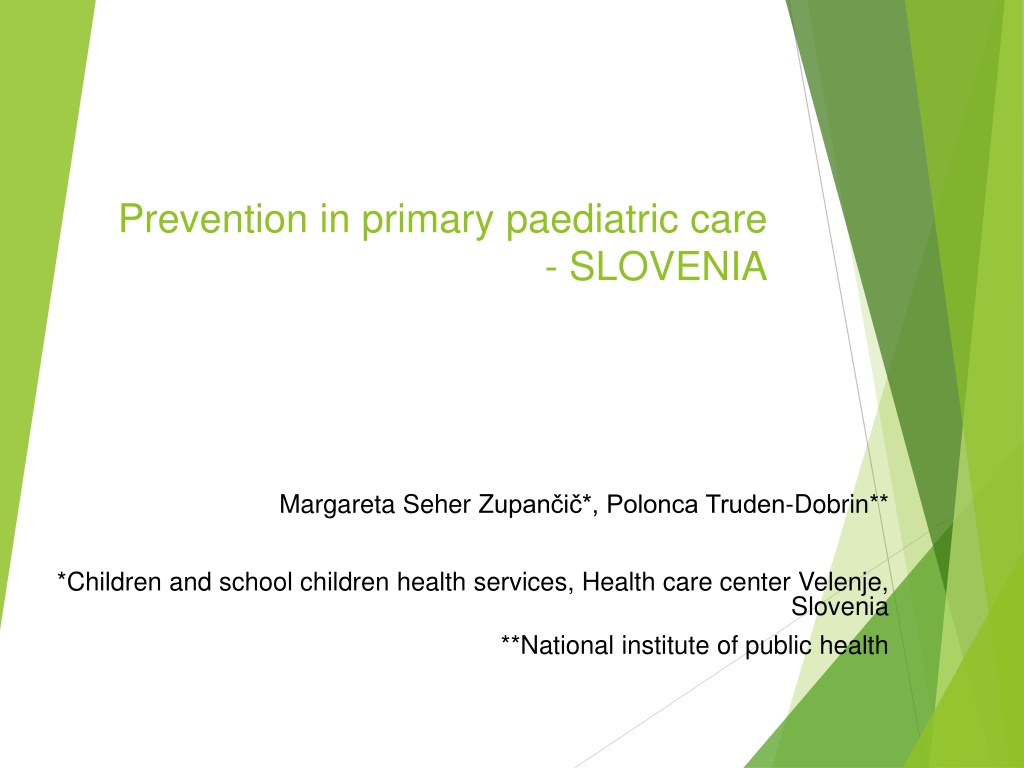
 undefined
undefined

